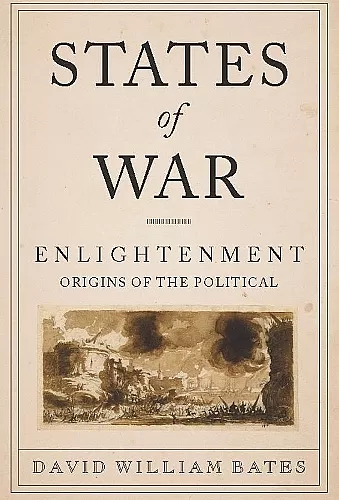States of War
Enlightenment Origins of the Political
Format:Hardback
Publisher:Columbia University Press
Published:28th Feb '12
Currently unavailable, and unfortunately no date known when it will be back

We fear that the growing threat of violent attack has upset the balance between existential concepts of political power, which emphasize security, and traditional notions of constitutional limits meant to protect civil liberties. We worry that constitutional states cannot, during a time of war, terror, and extreme crisis, maintain legality and preserve civil rights and freedoms. David Williams Bates allays these concerns by revisiting the theoretical origins of the modern constitutional state, which, he argues, recognized and made room for tensions among law, war, and the social order. We traditionally associate the Enlightenment with the taming of absolutist sovereign power through the establishment of a legal state based on the rights of individuals. In his critical rereading, Bates shows instead that Enlightenment thinkers conceived of political autonomy in a systematic, theoretical way. Focusing on the nature of foundational violence, war, and existential crises, eighteenth-century thinkers understood law and constitutional order not as constraints on political power but as the logical implication of that primordial force. Returning to the origin stories that informed the beginnings of political community, Bates reclaims the idea of law, warfare, and the social order as intertwining elements subject to complex historical development. Following an analysis of seminal works by seventeenth-century natural-law theorists, Bates reviews the major canonical thinkers of constitutional theory (Locke, Montesquieu, and Rousseau) from the perspective of existential security and sovereign power. Countering Carl Schmitt's influential notion of the autonomy of the political, Bates demonstrates that Enlightenment thinkers understood the autonomous political sphere as a space of law protecting individuals according to their political status, not as mere members of a historically contingent social order.
Bates's own position is supremely original and perfectly and clearly articulated. He shows that the political does not have to lead to fascism and violence and exclusion (clearly it has not prevented these things from taking place) but can have a more progressive, individualist, and anti-exclusionary form. -- James Martel, San Francisco State University In this breakthrough rereading of early-modern thought, David William Bates discovers the origins of liberal norms in and through the creation of a fully autonomous political domain. As Bates shows, it was no accident that construction of internal constitutionalist restraints on the state occurred just as the modern state emerged to its full external potential for global violence. Bates's argument is at the cutting edge in the history of political thought, and his interpretations of Thomas Hobbes, John Locke, and Jean-Jacques Rousseau renovate the study of each author. -- Samuel Moyn, Columbia University [A] masterful study. -- David Tkach The Review of Politics
ISBN: 9780231158046
Dimensions: unknown
Weight: unknown
280 pages